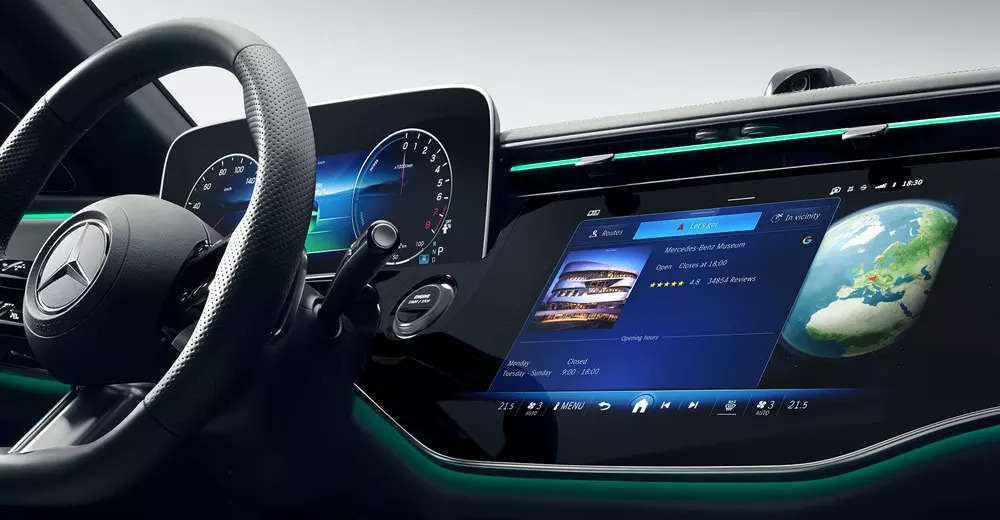
By Syed Shazil Hussain
Generative AI, which can produce realistic images, videos, audio, and text, is estimated to have an annual impact of USD 6 trillion to USD 8 trillion across various sectors. Mercedes-Benz recently used ChatGPT, a gen AI implementation, to power voice assistants in a beta program for over 900,000 vehicles.
In a recent episode of a podcast titled “Drivers of Disruption”, experts Philipp Skogstad, CEO of Mercedes-Benz R&D North America, and Ben Ellencweig, a senior partner at McKinsey & Company, delved into the transformative potential of generative AI (gen AI) in the automotive sector. Gen AI, epitomised by ChatGPT, has been making waves since its launch in November 2022, holding the promise to revolutionise various industries. With Mercedes-Benz at the forefront, the duo shared their insights into its applications, challenges, and the exciting possibilities it presents.
Gen AI integration
Mercedes-Benz, one of the pioneers in the automotive industry, set a precedent by becoming the first automaker to integrate ChatGPT into their vehicles. This decision was driven by the technology’s rapid evolution and positive reception within the company. Philipp Skogstad, Mercedes-Benz R&D North America’s CEO, recounted how the idea was born and how they swiftly rolled out the beta program, involving 900,000 users in testing.
Skogstad emphasized the importance of retaining Mercedes-Benz’s commitment to safety and data security throughout the process. The company’s culture of rapid iteration played a crucial role in bringing ChatGPT to their vehicles and ensuring its seamless integration with the existing technology, he added.
Skogstad further explained their approach to iteration, emphasizing the need for continuous improvement. Mercedes-Benz adopted a culture of constant innovation, blending the traditional automotive development cycle with the speed and agility of software development. This fusion enabled them to swiftly enhance their offerings and deliver cutting-edge experiences to their customers.
The CEO compared this approach to a subway system, where frequent iterations are analogous to catching the next train. It ensures that Mercedes-Benz stays at the forefront of technological innovation while safeguarding customer safety and data privacy.
Four important categories
Ben Ellencweig provided valuable insights into the potential applications of gen AI in the automotive sector. He highlighted four key categories where enterprises, including automotive manufacturers, are beginning to adopt gen AI:
Software Co-development: Gen AI facilitates collaborative software development with machines, enabling a more efficient and innovative approach.
Customer engagement: Gen AI enhances customer interactions, offering personalized experiences and services, such as call summarization and hyper-personalization.
Concision: Gen AI simplifies complex information, making it concise and accessible, which is invaluable in product development and safety protocols.
Content generation: The technology enables the creation of tailored content, from marketing campaigns to personalized user manuals, catering to individual preferences.
Ellencweig also emphasized gen AI’s potential to transform various aspects of the automotive industry, including repair and diagnosis, sales, marketing, and research and development.
Concerns about Gen AI
As gen AI continues to gain prominence, concerns about data security and ethical considerations come to the forefront. Mercedes-Benz and McKinsey stressed the importance of responsible use of the technology and transparency with customers. They outlined measures to protect data privacy and ensure data remains within the confines of the organization.
Moreover, they recognized the need for ongoing education and training to help employees and consumers effectively use and manage gen AI technologies. Acknowledging that humans will always play a critical role in providing the right prompts and making the final judgment, they emphasized the importance of coexistence between humans and AI.
Future of Gen AI in the auto sector
Looking ahead, both the experts shared their visions on gen AI’s future in the automotive industry. Skogstad envisioned cars seamlessly integrating into users’ digital and physical lives, providing intelligent assistance and personalized experiences. Mercedes-Benz aims to continually evolve its offerings, with regular updates and enhancements to ensure their vehicles remain at the forefront of technology.
Ellencweig highlighted the transformative potential of gen AI across the automotive industry, from enhancing the consumer experience to revolutionizing manufacturing processes and product development. He urged industry leaders to embrace education, experimentation, and scalability to harness the technology’s full potential.
In closing, the conversation revealed that gen AI is set to reshape the automotive landscape, offering unprecedented opportunities for innovation, while emphasizing the critical importance of ethical and responsible use to protect consumer interests and data.
















